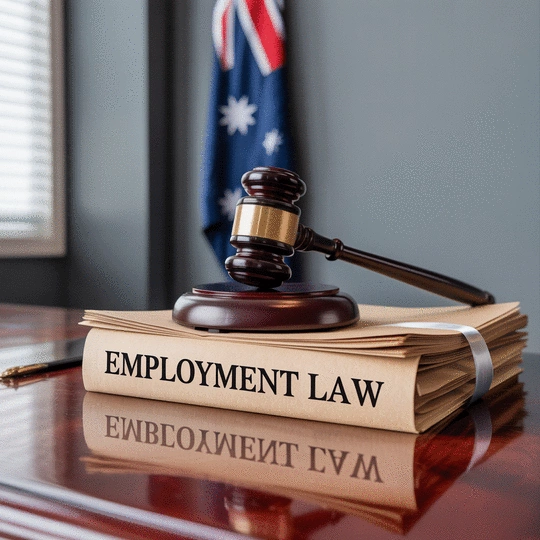Challenging Unfair Dismissal Decisions

Posted on: 2025-10-29
By: Clara Thompson
Understanding unfair dismissal appeals can feel like navigating a maze. Did you know that nearly 20% of all dismissal cases in Australia are deemed unfair? This statistic underscores the importance of knowing your rights and the appeal process. In this article, we’ll unpack the intricacies of unfair dismissal and what steps you can take to seek justice.
What You Will Learn
- What constitutes unfair dismissal, including key definitions like harshness, unjustness, and unreasonableness.
- The essential rights and protections under the Fair Work Act, including the right to appeal against unfair dismissal.
- The crucial steps for filing an appeal on time and gathering necessary documentation to support your case.
- When to seek professional legal guidance and how to choose the right representation for your specific needs.
- The benefits of union representation during unfair dismissal cases, including legal advice and enhanced negotiating power.
Overview of Unfair Dismissal Appeal Process
The appeal process for unfair dismissal involves several key steps which are crucial for a successful outcome. Below is a structured visual representation of these steps:
Step 1: Understand Unfair Dismissal
Recognize the factors that classify a dismissal as unfair, including harshness, unjustness, and unreasonableness.
Step 2: File Your Appeal
Ensure your appeal is lodged within the specified timeframe to maintain your right to appeal.
Step 3: Gather Evidence
Compile all necessary documentation and evidence that supports your claim of unfair dismissal.
Step 4: Engage with Fair Work Commission
Participate in the review process by providing required information and attending hearings as needed.
Understanding Unfair Dismissal Appeals in Australia
Navigating the world of unfair dismissal appeals can feel overwhelming, but you’re not alone! At Employment Law Solutions, we aim to clarify these complex legal processes so that both employers and employees can understand their rights and options. Let's delve into crucial aspects of unfair dismissals and what they entail.
What Constitutes Unfair Dismissal?
Unfair dismissal occurs when an employee is terminated from their job in a manner that is deemed harsh, unjust, or unreasonable. This can happen for various reasons, such as lack of evidence for misconduct or failure to follow proper procedures. Understanding what leads to an unfair dismissal can empower you in your employment journey.
Key Definitions and Examples
To better grasp the concept of unfair dismissal, it's helpful to look at some key definitions and examples. Here are a few critical points to consider:
- Harshness: This refers to whether the dismissal was excessively severe compared to the behavior that warranted it.
- Unjustness: This involves the fairness of the reasons provided for the dismissal.
- Unreasonableness: This indicates if the dismissal followed proper processes or if it was arbitrary.
For instance, imagine being terminated without a proper warning or a chance to improve your performance. Such actions could be classified as unfair dismissal, making it crucial to know your rights!
The Importance of Knowing Your Rights
Being aware of your rights as an employee is fundamental when facing unfair dismissal. It’s not just about legal jargon; it's about understanding the protections you have under employment law. Knowing these rights can be your first step toward seeking justice!
Understanding Employee Protections Under the Fair Work Act
The Fair Work Act is a cornerstone of employment law in Australia. It sets out various protections for employees, including:
- The right to appeal against unfair dismissal.
- Protections from discrimination and bullying in the workplace.
- Minimum notice periods and severance pay guidelines.
Familiarizing yourself with these protections can help you feel more secure in your workplace and empower you to take action if necessary.
Employee Rights and Protections Under Employment Law
In addition to the Fair Work Act, there are various other legal provisions that protect employee rights. Understanding these can be beneficial:
- The right to receive a fair wage.
- Access to safe working conditions.
- The entitlement to leave and flexible work arrangements.
By knowing these rights, you're not just an employee; you become an advocate for yourself and your colleagues. And remember, Employment Law Solutions is here to help you navigate through all of this!
Navigating the Appeal Process for Unfair Dismissal
Understanding how to navigate the appeal process can significantly impact the outcome of your situation. But don't worry! In the next section, we’ll break down the steps you need to follow to file an appeal effectively.
Pro Tip
Did you know? Keeping a detailed record of all communications related to your dismissal can significantly strengthen your appeal. Document conversations, emails, and any relevant incidents leading up to your termination. This evidence can provide clarity and support your case during the appeal process.
Frequently Asked Questions About Unfair Dismissal Appeals
- What exactly is unfair dismissal in Australia?
- Unfair dismissal occurs when an employee is terminated from their job in a manner that is considered harsh, unjust, or unreasonable, even if the employer had a valid reason for dismissal. This can include lack of proper procedure or disproportionate punishment.
- What are my rights under the Fair Work Act regarding dismissal?
- The Fair Work Act provides several protections, including the right to appeal against unfair dismissal, protection from discrimination and bullying, and guidelines for minimum notice periods and severance pay. Understanding these rights is crucial for employees.
- How long do I have to file an unfair dismissal appeal?
- It is crucial to file your appeal within the specified timeframe. Generally, an application for unfair dismissal must be made within 21 days after the dismissal took effect. Always check the current deadlines with the Fair Work Commission or a legal professional.
- What kind of evidence should I gather for my appeal?
- You should gather all documentation and evidence that supports your claim, such as employment contracts, performance reviews, written warnings, communication records (emails, messages), and any witnesses who can provide a statement. A detailed record of all communications leading up to the dismissal is highly beneficial.
- When should I seek professional legal guidance for my case?
- It's advisable to consult legal experts if you are uncertain about your rights, need guidance on preparing your appeal documentation, or if the Fair Work Commission requests additional information. Seeking help early can significantly improve your chances of a successful outcome.
- What are the benefits of union representation in an unfair dismissal case?
- Union members can leverage their union's resources, which often include legal representation, advice from experienced professionals, and established processes for dispute resolution. Union representation can also enhance an employee's negotiating power.
Conclusion and Next Steps for Your Appeal
As we wrap up our discussion on unfair dismissal appeals in Australia, it’s crucial to remember that understanding the process is your first step towards seeking justice. We’ve reviewed the essential guidelines, from filing your appeal to navigating the intricacies of the Fair Work Commission. By being informed and proactive, you can significantly enhance your chance of a successful outcome!
Key takeaways include the importance of adhering to deadlines, knowing your rights under the Fair Work Act, and being prepared with the necessary documentation. As you consider your next steps, keep in mind that the journey can be challenging, but you’re not alone. Whether you're facing difficulties or just seeking clarity, I encourage you to reach out for support.
Recap of the Appeal Process and Key Takeaways
The appeal process can seem daunting, but let’s break it down into manageable components. Remember, the key steps include:
- Understanding what constitutes unfair dismissal.
- Filing your appeal on time.
- Gathering all relevant evidence and documentation.
- Engaging with the Fair Work Commission during the review process.
By following these steps, you can approach your appeal with confidence. Don’t hesitate to revisit the guidelines outlined in this article; they’re designed to support you every step of the way as you prepare your case!
Resources and Tools for Preparing Your Appeal
To make the appeal process smoother, I’ve compiled some helpful resources that can assist you in preparing your case effectively. These tools can provide structure and clarity:
- Downloadable Checklists: Ensure you have all necessary documents ready.
- Flowcharts: Visual guides that outline the steps to take in your appeal.
- Webinars and Workshops: Attend sessions to deepen your understanding of your rights and the process.
Utilizing these resources can empower you to feel more equipped as you navigate your appeal. And remember, at Employment Law Solutions, we strive to simplify the legal landscape for you!
Seeking Professional Guidance
If you find yourself feeling overwhelmed or unsure about your appeal, seeking professional guidance may be the best path forward. Engaging with a legal expert can provide you with personalized support tailored to your unique situation.
When considering legal representation, it’s essential to ask the right questions. Here are some tips to consider:
- Experience: Look for lawyers who specialize in employment law and have experience with unfair dismissal cases.
- Reputation: Seek recommendations and read reviews to find trustworthy legal representatives.
- Communication: Make sure the lawyer is approachable and willing to explain complex legal terms in simple language.
Choosing the right professional can make a significant difference in the outcome of your case, so take your time in making this important decision!
When to Consult with Legal Experts
It’s wise to consult with legal experts at various stages of your appeal. Here’s when you should consider reaching out:
- If you feel uncertain about your rights.
- When you’re preparing your appeal and need guidance on documentation.
- If the Fair Work Commission requests additional information or documentation.
Remember, it’s never too early to seek help! Legal experts can provide guidance that empowers you to make the best decisions for your appeal.
Choosing the Right Legal Representation for Your Case
Finding the right legal representation is crucial. Think about what qualities matter most to you. Are you looking for someone who is results-driven, compassionate, or perhaps highly knowledgeable about your specific case? Take the time to meet with potential lawyers and discuss your situation. This will help you gauge their approach and determine if they’re the right fit for your needs.
Union Representation and Its Benefits in Unfair Dismissal Cases
If you’re a member of a union, consider leveraging their resources. Unions can provide crucial support during unfair dismissal appeals, including legal representation and advice from experienced professionals. They often have established processes for addressing disputes, which can save you time and stress. Additionally, union representation can enhance your negotiating power. For more details on the role of unions in protecting worker rights, you can refer to information provided by the Parliament of Australia's Department of Parliamentary Services.
Engage with Us for More Information
We want to hear from you! If you have questions or experiences to share about your own journey through the unfair dismissal process, please engage with us. Your insights could help others in similar situations. Whether it's a specific case query or a general question, don’t hesitate to leave a comment below.
At Employment Law Solutions, we believe that knowledge is power. Together, we can unpack the complexities of employment law and work toward a fair resolution. Let’s navigate this journey together!
Recap of Key Points
Here is a quick recap of the important points discussed in the article:
- Unfair dismissal occurs when an employee is terminated in a harsh, unjust, or unreasonable manner.
- Know your rights under the Fair Work Act, including the right to appeal against unfair dismissal and protections from workplace discrimination.
- Gather all necessary documentation and evidence to support your appeal for a better chance of success.
- Engaging with a legal expert can provide personalized support and guidance throughout the appeal process.
- Consider union representation for additional support and resources during unfair dismissal cases.
 Understanding your rights in the workplace is not just beneficial; it's essential. With 1 in 5 Austr
Understanding your rights in the workplace is not just beneficial; it's essential. With 1 in 5 Austr
 Understanding unfair dismissal appeals can feel like navigating a maze. Did you know that nearly 20%
Understanding unfair dismissal appeals can feel like navigating a maze. Did you know that nearly 20%
 Contract compliance is more than just a legal obligation—it's a cornerstone of effective business
Contract compliance is more than just a legal obligation—it's a cornerstone of effective business
